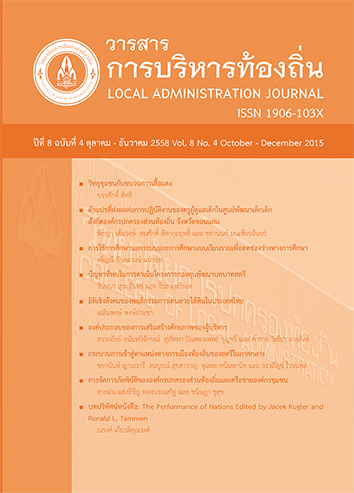Using Non-Formal Education and Inclusive Education to Reduce the Gap of Educational Exclusion (การใช้การศึกษานอกระบบและการศึกษาแบบเรียนรวมเพื่อลดช่องว่างทางการศึกษา)
Keywords:
Non-formal education, Inclusive education, Education for All, การศึกษานอกระบบ, การศึกษาแบบเรียนรวม, การศึกษาเพื่อปวงชนAbstract
Relying on data from documents, this paper discusses the rationale of inclusive education vis-à-vis non-formal education and analyzes the functional benefits of the two education concepts. It demonstrates that both non-formal education and inclusive education share the same ideological root of making education available and accessible to all. Both are very similar in terms of adaptability and flexibility method of instruction, study duration, study location, content and curriculum that can be adjusted to suit the needs of individual learners. Inclusive education, however, is an educational approach that recognizes the equal rights of all learners to access quality education. It is argued that the two education systems can be used to help achieve the goals of Education for All program of UNESCO. This paper also provides guidelines to use inclusive education for human capital development.
การใช้การศึกษานอกระบบและการศึกษาแบบเรียนรวมเพื่อลดช่องว่างทางการศึกษา
บทความนี้ ได้วิเคราะห์และอภิปรายเปรียบเทียบถึงแนวคิดเชิงเหตุผลและบทบาทหน้าที่ของการจัดการศึกษานอกระบบและการจัดการศึกษาแบบเรียนรวม ที่ไม่จำกัดสถานภาพทางเศรษฐกิจ สังคม วัฒนธรรมและเชื้อชาติ บทความนี้ชี้ให้เห็นว่า การจัดการศึกษาทั้ง 2 รูปแบบมีความคล้ายคลึงกันในเชิงหลักการและอุดมการณ์ของการจัดการศึกษา การจัดการศึกษาทั้ง 2 รูปแบบต่างมีเป้าหมายร่วมกันในการสร้างความเท่าเทียมกันให้แก่สมาชิกทุกคนในสังคมและมองว่า การศึกษาเป็นสิทธิที่ทุกคนสามารถเข้าถึงได้ ทั้งการจัดการศึกษานอกระบบและการศึกษาแบบเรียนรวมต่างก็มีความยืดหยุ่นและสามารถนำมาปรับประยุกต์ในเรื่องวิธีการสอน ระยะเวลาการเรียน สถานที่เรียน หลักสูตรและเนื้อหาสาระ เพื่อให้สอดคล้องกับความต้องการของผู้เรียน อย่างไรก็ตาม การศึกษาแบบเรียนรวม ให้ความสำคัญกับเรื่องสิทธิของการได้รับการศึกษาที่มีคุณภาพ ไม่เพียงแต่ความเท่าเทียมกันเท่านั้น ในบทความนี้ได้ให้ข้อคิดว่า การจัดการศึกษาทั้ง 2 รูปแบบ สามารถนำมาใช้เป็นยุทธศาสตร์ที่ช่วยให้บรรลุเป้าหมายของแผนงานการศึกษาเพื่อปวงชนขององค์การ UNESCO นอกจากนั้นบทความนี้ยังได้ให้แนวทางในการนำการจัดการศึกษาแบบเรียนรวมมาใช้ในการพัฒนาทรัพยากรมนุษย์ของประเทศ
Downloads
Additional Files
Published
How to Cite
Issue
Section
License
The copyright of all articles published in the Local Administration Journalis owned by the College of Local Administration, Khon Kaen University.



